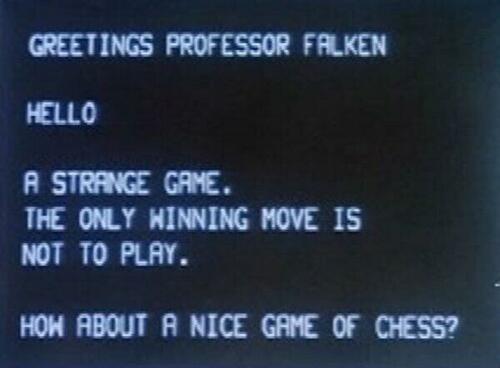Stop Playing The Loser’s Game
Authored by Mark Jeftovic via BombThrower.com,
Your Facebook Friends Are Wrong About… Everything
I haven’t really been active on Facebook since the COVID era when it became pretty obvious to me that most of the people I grew up with or went to college turned into authority addicts and were thoroughly brainwashed by mainstream agitprop.
They’re still like that today…
…and they seem to buy it hook-line-and-sinker.
Libertarian podcaster Tom Woods, used to put out mini e-books titled “Your Facebook Friends Are Wrong About….”, and he’d fill it in with whatever the lemmings are up in arms about at the time: vaccines, mask mandates, gun control, whatever.
I’d been marvelling at just how dead the Facebook/Meta platform has become since the COVID years. Like tumbleweeds, really.
But over the past few months I had been posting a bit more there, but was trying to keep the politics out of it (like many, I’m a long-time sufferer of outrage-fatigue).
All that changed when Charlie Kirk was assassinated and the reaction from “the left” was just so appalling and indefensible that I got more vocal about it in my feed.
It was a mistake, and I ended up creating a couple of long-running comment threads and getting piled-on by people I knew in high school, or college or my early tech days in Toronto.
They started wearing me down with increasingly deranged and nonsensical talking points that seemingly came straight out of an Antifa 101 pamphlet.
A former bandmate sent me a private message featuring some “anti-hate expert” (a dude dressed up as a woman) lecturing me on why Charlie Kirk had it coming…
Another guy from my high school started comment bombing every post with 40 or 50 anti-Trump memes and multi-paragraph rants in ALL CAPS that ended with YOU ARE THE PROBLEM.
Fucking. Unhinged.
A couple nights ago I finally realized what I was doing to myself and deleted those threads (and blocked the comment bomber). I feel a little sheepish that it took me nearly a week to realize that I too, had been caught up in The Loser’s Game: arguing politics with my hometown friends on social media.
When you spend your time and mental energy on Facebook, getting sucked into emotionally charged political debates, trying to convince people you don’t really know anymore, can’t influence, and wouldn’t deal with in real life, you’re not just wasting time—you’re handing your life force over to people who are in all practical measures, losers.
(How can I say that these people are losers? Because they are wasting their lives arguing on Facebook. And as long as I participate in those arguments, then I’m being a loser, too).
The above is a screen grab from one of my favourite books of all time: Stop Being A Loser. I laughed out loud when I read it as I spliced it into this post, but it was also bittersweet, because I realized it was talking about me.
But I can’t help but notice that Social platforms like Facebook, Reddit and Bluesky have become breeding grounds for collectivist berserkers, and sundry boot-lickers.
They spend their days revelling in miserabilism, and they are quick to swarm anyone violating the boundaries of their groupthink.
I’ve also noticed that they take special exception toward anybody with independent thought or exercising personal agency.
Thank-you, Time Magazine
The single greatest heresy you can commit in our current collectivist zeitgeist, is to believe, or worse, demonstrate, that you can improve your own life without the mediation or intervention of The State.
Pyrrhic Victory & Opportunity Cost
Imagine you spend 45 minutes, or a couple of hours – arguing with some jerk you knew in Grade 10, who you never hung out with then, and you have never even thought about since. He insists Charlie Kirk’s assassin was a MAGA extremist and the real martyr of the day is Jimmie Kimmel.
You go back and forth with him over the course of a few days, weeks even, …and then, you actually bring him around to your point. You’ve won! Right?
Well… actually…
You’ve wasted the better part of an entire working day (or more) converting one, single, low importance, inconsequential NPC around an issue that even you are going to stop thinking about as much in a few days, weeks or months from now.
In that same time you could have:
-
written a pitch deck that will bring in a 7-digit investment to one of your business ventures
-
knocked out a blog post that racks up over 100K views and adds 500 new subscribers to your email list
-
created a new email sequence that brings in a steady trickle new customers to one of your websites, every day, every week, forever
-
optimized one of your conversion funnels and doubled your ROI
-
fixed that software bug that was costing you $50K a year
-
interviewed enough people to find that next great hire
-
read through about a half-dozen 10-Qs of companies, one of which could 100X over the next decade
But you didn’t do any of those things.
You spent all that time and wasted all that energy arguing with someone you don’t really care about, whose intellect is too crude to digest anything that demands critical analysis anyway. They have Type 1 TDS and they’re well beyond Stage 4 (terminal brain worms).
If you really wanted to spend all that time on a single person, you would have been better off taking your spouse or kids on a special day trip – something you’ll actually remember, with people you genuinely care about.
Instead, you forfeited all that, it’s called opportunity cost – and these are all just examples of the kinds of opportunities playing The Loser’s Game has cost you: endlessly arguing with knuckle-dragging retards on a social platform infested with people who envy and loathe high agency people on principle.
As WOPR, the 1970’s-era super-computer finally figured out in the classic flick of our youth, War Games: the best strategy is not to play.
Since the assassination of Charlie Kirk, I have been playing The Loser’s Game. Arguing with people on social media about issues they’ve already made up their minds about anyway.
Connecting The Dots
General semantics is the discipline that studies how language and symbols influence human thought and behavior, and how our abstract representations of reality can distort our perceptions of it.
In his seminal work on the topic, The Book of Radical General Semantics, Gad Horowitz give us the metaphor of the dots:
Christopher Mayer on William O’Hanlon’s “The Reality of Reality”
(I read it as cited in Chris Mayers’ “How Do You Know?“)
In the 4×6 grid on the left each of those dots represents a “fact”.
As you can see, you can gather together a collection of “facts”, a group of happenings nobody disputes and are objectively real in terms of “they happened”.
But there are innumerable ways to “connect the dots”, which is surmising or assessing how all these separate, objective facts relate to each other.
And this makes a HUGE difference.
There’s a reason I bring this up here.
The Great Bifurcation, revisited.
There are two types of people:
Most people have a tendency to connect the observed dots using one path, and in their minds, that path is the only valid pattern to connect the dots.
That path becomes their Truth. Any other pathway that can also connect those very same dots is heresy, conspiracy, hate speech, denialism or some other manner of thought crime.
Some people (fewer in number) understand that there are numerous possible explanations of how the observed facts could relate to each other.
Even more important, is that the most probable path (the obvious one) is not necessarily the most accurate, nor is the most agreed-upon path (consensus-driven). Those paths could be inaccurate, and by “inaccurate”, what I really mean is wrong.
The difference between these two types of people is cognitive. The latter have access to an additional layer of mental abstraction that the former don’t even comprehend exists.
And those are the people I’ve been arguing with on social media.
I’ve written in the past about The Great Bifurcation – which was originally about wealth inequality, and I thought that would be a bad enough problem in our collective future.
Lately I’ve come to understand it primarily as a cognitive gap.
The human race is splitting into two completely different species – a la Morlocks and Elohim, and the barrier between them isn’t money. It’s the level of mental abstraction the individuals are capable of functioning at.
W R Clement’s book, Quantum Jump, a favourite of mine that I often to refer to, ascribes the entire Enlightenment and ensuing Scientific Revolution to the discovery of perspective (a.k.a “God’s Space”) in Medieval art.
Something similar is happening today – with the advent of cyberspace and the phenomenon of non-linearity.
This has all kinds of knock-on effects, not the least of which is the accelerating acceleration in the rate of change (tachyosis or hyper-acceleration).
Most people, are ngmi. And their inability to cognitively function at the faster-paced, non-linear levels of mental abstraction induces a kind of psychosis (“Future Shock“).
Connecting The Dots
Back to the dots that comprise reality:
Just by way of example, here’s three different pathways through the dots around the objective event of Charlie Kirk’s assassination:
-
The generally confirmed consensus view that Kirk was murdered by a kid from a Republican family who had been radicalized into far-left ideology, mostly acting alone, but amongst far-left groups who may have had foreknowledge of the plan.
-
This one was emailed to me by a reader: Charlie Kirk was a crisis actor, the death was faked, here’s proof (followed by a link to a 45 minute frame-by-frame video analysis of the ripple in his shirt as the bullet struck)
I’ll throw out another one that actually keeps intruding into my thoughts:
-
The Kirk assassination was a Reichstag Fire moment—carried out by entrenched MAGA operatives who may have also staged the July 13, 2024 attempt on Trump in order to manufacture a crisis, catalyze public reaction, and install an authoritarian “solution.” Standard Hegelian dialectic.
This was the moment that put Trump back into the White House.
Could it have been orchestrated?
All three lines connect the same observed dots. Which is correct?
I have no idea, and neither do you.
Beyond a few first principles—like “don’t murder people,” “everyone gets free speech,” and that a talk show host losing his job isn’t more tragic than a young man getting his head blown off in public —the rest is just hamster wheels in our heads.
Which is why the best use of your time and energy is focusing on what you can control, like how you respond to life events and focus on what’s actually within reach: honing your craft, developing your innate talents, expanding your skills, and deepening your relationships. That’s where the leverage flips and you gain more than you lose.
That is playing the winner’s game.
Of all the truly successful people that you know – how often do you observe them screeching or engaging in high-tension political histrionics on social media?
The most successful people I know don’t even have Facebook accounts. Their socials, if they have any, are run by interns.
The eminent computer pioneer Jaron Lanier once put out an entire book on “10 Reasons why we should all delete our social media accounts“. Reason number one is “it turns you into an asshole”.
I have been guilty of playing The Loser’s Game.
(As comedian Cathy Ladman once put it, “Some of these I do, just for me”)
It’s time to get back to work.
Join the Bombthrower mailing list free and get a copy of the CBDC Survival Guide when it drops. Follow me on X here.
If you want a special trial deal to check out The Bitcoin Capitalist, you can grab that here »
Tyler Durden
Tue, 09/23/2025 – 05:00ZeroHedge NewsRead More














 R1
R1
 T1
T1


